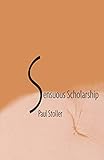Sensuous Scholarship / Paul Stoller.
Material type: TextSeries: Contemporary EthnographyPublisher: Philadelphia : University of Pennsylvania Press, [2010]Copyright date: ©1997Description: 1 online resource (184 p.) : 11 illusContent type:
TextSeries: Contemporary EthnographyPublisher: Philadelphia : University of Pennsylvania Press, [2010]Copyright date: ©1997Description: 1 online resource (184 p.) : 11 illusContent type: - 9780812216158
- 9780812203134
- Ethnologie -- Philosophie
- Ethnology -- Methodology
- Ethnology -- Philosophy
- Ethnology -- Methodology
- Ethnology -- Philosophy
- SOCIAL SCIENCE -- Anthropology -- General
- Sensuality
- Songhai (African people) -- Religion
- Songhai (African people) -- Social conditions
- Songhai (African people) -- History
- Songhai (African people) -- Religion
- Anthropology
- Folklore
- Linguistics
- SOCIAL SCIENCE / Anthropology / General
- 305.8001
- online - DeGruyter
- Issued also in print.
| Item type | Current library | Call number | URL | Status | Notes | Barcode | |
|---|---|---|---|---|---|---|---|
 eBook
eBook
|
Biblioteca "Angelicum" Pont. Univ. S.Tommaso d'Aquino Nuvola online | online - DeGruyter (Browse shelf(Opens below)) | Online access | Not for loan (Accesso limitato) | Accesso per gli utenti autorizzati / Access for authorized users | (dgr)9780812203134 |
Browsing Biblioteca "Angelicum" Pont. Univ. S.Tommaso d'Aquino shelves, Shelving location: Nuvola online Close shelf browser (Hides shelf browser)

|

|

|

|

|

|

|
||
| online - DeGruyter A Natural History of the Romance Novel / | online - DeGruyter From Trickster to Badman : The Black Folk Hero in Slavery and Freedom / | online - DeGruyter Court Culture and the Origins of a Royalist Tradition in Early Stuart England / | online - DeGruyter Sensuous Scholarship / | online - DeGruyter The Taste of Ethnographic Things : The Senses in Anthropology / | online - DeGruyter The International Commission of Jurists : Global Advocates for Human Rights / | online - DeGruyter The Most Beautiful Man in Existence : The Scandalous Life of Alexander Lesassier / |
Frontmatter -- Contents -- Acknowledgments -- Prologue: The Scholar's Body -- Part One: Embodied Practices -- Part Two: Body and Memory -- Part Three: Embodied Representations -- Epilogue: Sensuous Ways of Knowing/Living -- Notes -- Works Cited -- Films Cited -- Index
restricted access online access with authorization star
http://purl.org/coar/access_right/c_16ec
Among the Songhay of Mali and Niger, who consider the stomach the seat of personality, learning is understood not in terms of mental activity but in bodily terms. Songhay bards study history by "eating the words of the ancestors," and sorcerers learn their art by ingesting particular substances, by testing their flesh with knives, by mastering pain and illness.In Sensuous Scholarship Paul Stoller challenges contemporary social theorists and cultural critics who-using the notion of embodiment to critique Eurocentric and phallocentric predispositions in scholarly thought-consider the body primarily as a text that can be read and analyzed. Stoller argues that this attitude is in itself Eurocentric and is particularly inappropriate for anthropologists, who often work in societies in which the notion of text, and textual interpretation, is foreign.Throughout Sensuous Scholarship Stoller argues for the importance of understanding the "sensuous epistemologies" of many non-Western societies so that we can better understand the societies themselves and what their epistemologies have to teach us about human experience in general.
Issued also in print.
Mode of access: Internet via World Wide Web.
In English.
Description based on online resource; title from PDF title page (publisher's Web site, viewed 23. Jun 2020)


